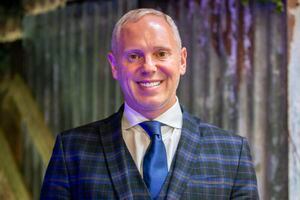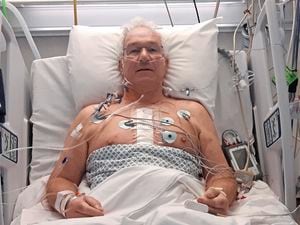‘I’m living my best life’
Lawyer, event host, interviewer, dancer – Rob Rinder packed his many personas into the Liberation Day weekend, running the Specsavers community events. James Falla tried to squeeze in a question or two as the Judge gave his verdict on Occupation, Liberation, Ukraine and Guernsey...

ROB ‘JUDGE’ RINDER was having a great Liberation weekend. Charming, personable, and with an appropriate back story, he was an inspired choice to be the compere for the Specsavers Hangar Balls and the Liberation Day Tea Dance.
And you could tell he was loving it. We were interrupted three-quarters of the way through our microscopic interview slot on Monday morning.
‘How are you?’ asked the passer-by in the Beau Sejour Concourse.
‘People keep asking me if I’m OK,’ he said. ‘What’s not to like? I’m living my best life. It’s been so fun.’
The day before he’d eaten at Octopus. That morning, as sirens sounded at 9am to mark Liberation Day, he’d been sea swimming at the bathing pools.
‘I genuinely didn’t know what to expect,’ he said of his first visit to Guernsey.
‘All I can say in the beginning, and it’s not because I want to win friends and influence people, but I’m definitely a donkey – sorry Jersey. I’m not even joking. It’s just nicer, nicer people.’
Mr Rinder is still a barrister and worked for a while in Jersey a few years ago.
‘The people are very nice, but I thought when somebody said come to Guernsey, it would be a sort of slightly smaller version of the same thing.
‘But I hadn’t appreciated just how culturally different it is. This is a community, in the truest, most blessed sense of that word.
‘It has all of the friendliness of a village without any of the downsides.’
He regales his tale of returning to his hotel – in his towel – from his swim that morning.
‘I’ve been stopped by people who just want to talk. And if you think about people like Dame Mary [Perkins], there’s this degree of shared ordinariness. It doesn’t matter who you are. People are, in the truest sense, evaluated by the content of their character here, which is really very special.
‘I’ve fallen in love with the place. If it wasn’t for the house prices, I’d be house-hunting.’
He was in his element at the hangar balls and the tea dance. Able to perform – he wanted to be an actor until, so the story goes, he realised how his big friend Benedict Cumberbatch was so much better than he was – and dance, those weeks on Strictly Come Dancing in 2016 not wasted, but there was another significant reason why Mr Rinder made the best possible guest.
In 2018 he was invited on to the BBC series Who Do You Think You Are, which interrogated the family tree and highlighted the story of his Polish-born grandfather, who survived the holocaust in which the rest of his family were murdered.
He’s since gone on to make further well-received documentaries for the BBC on the holocaust.
After the war ended, his grandfather was one of the 300 Windermere Children, taken by a charity for a new life in the Lake District.
He sees the similarities between that experience, those of the Guernsey evacuees, who left the island, sometimes separated from parents or partners, and those fleeing war-torn Ukraine, which makes Liberation so relevant in 2022.
‘There’s so many kinds of connective tissues and echoes between my own personal story, my grandfather’s story, and the lived experiences of people who were here, many of whom remember are still alive, and what it meant to be separated from loved ones.’
The Occupation experience teaches islanders not to be complacent about these sort of things, he said, and encourages reflection on the situation in Ukraine.
‘I think in their DNA “Guernseyites” know its precarious. I’ve met some brilliant people here who are part of the organisation delivering tons of stuff to the Ukraine borders.
‘For those fleeing that country there is such a similar echo to 1940. Eight weeks ago they were computer programmers in Kyiv, worrying about the work-life balance, going to lovely bars. They had all of that and eight weeks later that’s all disappeared.
‘I hope Guernsey people don’t take the magic of these islands for granted. We have all of the outward vestiges of the first world, it’s so beautiful, fabulous bars, all the things that you think cushion yourselves, protect you from dangers of our democracy disappearing.’
In the Second World War most Brits had an almost unique experience in Europe, living in freedom rather than under occupation.
‘So to see, be alongside and share Liberation Day with people who are British, and knew in the truest sense what it was to touch the face of tyranny, who knew what it was to be occupied by Nazi fascism, and knew what it is to have a thirst for freedom, and what that really means, really has a deep echo from my past in a way that I hadn’t anticipated.’
So there were two nights of dancing and celebration at the hangar balls – ‘You have a choice to look back in sombre reflection and get stuck, or to move forward with optimism, and that’s what the hangar balls are about’.
‘It’s been completely amazing. I’m not sure what the collective noun is but it’s a joy of people here in Guernsey.’
Then Mr Rinder was about to share Liberation Day with the island’s Occupation and evacuation generation. Share being the key word.
‘I’m going to try to speak to as many people as possible, especially those who have lived memories of the past. I would always encourage everybody, especially young people, to sit down if they can, to have that rich privilege of speaking to somebody who remembers.
‘Sadly you will be aware that the number of survivors of Occupation are dwindling and so what they have to say is of more urgent importance now more than ever.
‘You, as Guernsey’s second, third generation have special obligation to hear their stories and become witnesses to it.
‘And by them telling their stories and making them personal, you’re teaching the next generation to do something enormously powerful and radical.
‘Sadly we haven’t learned the tragic message, but that doesn’t nevertheless make it any less true, which is if we forget the past we’re doomed to repeat it.
‘The more we tell the stories of those people that are here today that have those memories, the better chance we have of being less complacent in the rich gifts that we have of being free.’
Before the fireworks went off over Castle Cornet the ‘Judge’ would already be back at home. But professionally, what’s next for the legal man who was discovered by showbiz after he submitted TV scripts he’d written in his spare time?
There is another documentary on the way for the BBC about Israel and Palestine. Mr Rinder has been praised for his ability to ask the deep questions at the right time – his legal background giving him all the tools to make a great interrogator. I noted that before we met – sadly I had no chance to show any interview skills, as I barely needed to ask a question.
‘In general terms what I really like to do is make the law more accessible for the general public. If you can’t explain your law, especially international and consumer law, you are a bad lawyer.
‘I want everybody to be able to think it’s their law, they understand it, so making programmes like that is important. To an extent that’s what Judge Rinder does, and that will go on in the future here, and perhaps in the US, we’ll see.
‘I make sure that’s true of every issue, so politics, whether that’s presenting Good Morning Britain, or making documentaries.
‘And I’m writing a fun novel. Think about a cross between…,’ he tails off, for once lost for words. ‘There are lots of surprises in it.’
We parted and Mr Rinder entered the Sir John Loveridge Hall to rehearse for the tea party. He’d been told that he could be dancing with the Countess. He had certainly been getting in practice during the hangar balls.
‘It was such a joy to dance, to do all the things I learned in Strictly. Where are you going to go to do a foxtrot or a jive? There isn’t anywhere in London.
‘I got to do a foxtrot, I got to do a waltz, I can’t say I remembered much, but it didn’t matter.’





